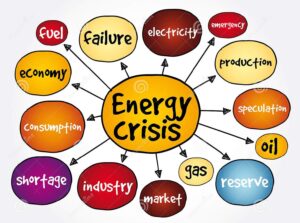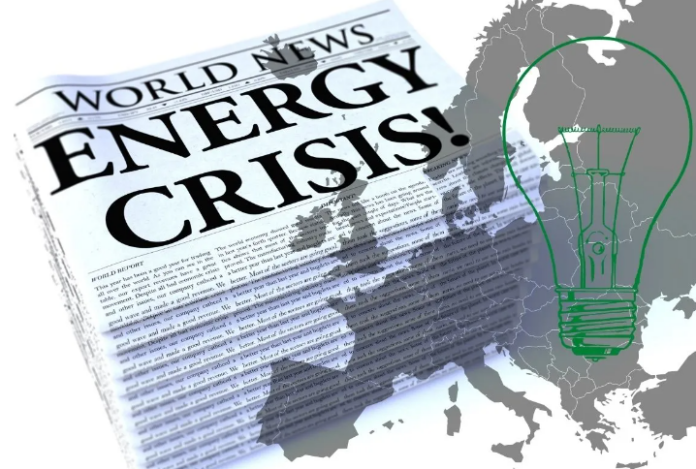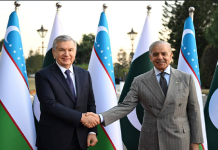BY Dr. Sahibzada Muhammad Usman
Europe has had several misfortunes in the recent past. Beginning with the pandemic, followed by price rises, poor industrial productivity, and the Russia-Ukraine conflict, it is today confronted with several difficulties that have wide-ranging national and global ramifications. The embargo on Russia imposed by the E.U., United Kingdom, and the United States is proving to be a pitfall for the E.U. group. Before Russia attacked Ukraine, Russia provided 40 per cent of Europe’s natural gas requirements via the Nord Stream 1 pipeline. During the crisis, several strategic decisions were made, including U.S. bans on Russian goods and banks. However, gas and oil were excluded due to their reliance on Russian energy supplies.
Washington intends to prohibit gas and oil supplies from Moscow by 2023, which appears unrealistic given the present global energy situation. The United States believes that future sanctions on Russian gas and oil might harm the Russian economy, given that oil exports account for 40 per cent of Russia’s export income. Russia, in contrast, is looking for new lucrative gas and oil importers. In response to the E.U. trade sanctions, Russia has already reduced its supply to E.U. nations from the pre-invasion level of 40 per cent to 9 per cent, triggering a chain of disastrous consequences, including price increases and poor industrial outputs.
Pakistan is an import-dependent nation. As reported by the Pakistan Trade Development Authority, more than half of Pakistan’s gas and oil is supplied from Saudi Arabia, 34 per cent from the United Arab Emirates, and none from Russia.
It appears that the conflict between Ukraine and Russia would have no negative impact on Pakistan. But it’s not true; as a result of Russia’s reduction of supply to E.U. nations, the U.K. and the E.U. responded swiftly to adjust to the situation that will affect energy supplies to Pakistan. Ursula von der Leyen, president of the European Commission, issued the following statement “we need to become self-reliant on Russian gas, coal, and oil, and we must act immediately to reduce the effects of energy prices, broaden our supply of gas for the cold season, and speed up the green power transition”. As a result, supplies of LNG from nations like Qatar to Europe have surged by 100 per cent compared to the previous year, indicating that E.U. members would depend more on replacements for Russia’s energy supplies. Europe is also seeking more importing nations outside Russia to satisfy its demands.
In response to the increased demand for energy resources caused by the attack on Ukraine, the nations exporting oil and gas to Pakistan, such as Saudi Arabia, may expand their supply to Europe, regardless of Pakistan’s requirements. This might set off a chain of disastrous events in Pakistan.
Pakistan’s energy sector is in danger owing to insufficient energy supply to meet the country’s expanding demand during the previous several decades. Pakistan is now dependent on imported energy sources such as gas and oil. In 2019, the Asian Development Bank produced a white paper asserting Pakistan’s energy insecurity. In addition to Pakistan, other nations, including affluent nations, are also energy vulnerable. As a result of the dynamic nature of the energy business, there are several instances of market expansion followed by a dramatic decline and contraction. But the present problems are distinct in several ways.
The current spike in energy prices has provided us with a view into the future, where marketplace disruptions may occur if the shift to low-carbon energy sources is not regulated or emphasized appropriately. In the absence of long-term energy conservation measures from the state level, Pakistan might see a particularly difficult and deadly winter. Due to the enormous pressure that Europe is feeling as a consequence of the gas and oil shortage, the Middle Eastern nations, which serve as the primary source of imports, are likely to exacerbate the issue.
The crisis between Russia and Ukraine has produced a spike in fuel costs, jeopardizing the supplier base and making it difficult for Pakistan to maintain the efficient functioning of its power station. To benefit from the lucrative European markets, LNG firms have violated their contracts with Pakistan. Multiple LNG cargoes slated for delivery in recent months were cancelled by long-term suppliers, severely constricting supply and thus resulting in issues for Pakistan. Pakistan is presently compelled to purchase expensive LNG. Pakistan’s State Minister for Petroleum, Musadik Malik, said that the country’s inability to locate a bidder for LNG slots necessitated a switch to alternative energy sources for electricity production, which might require a month to bear fruit. The current position is that we’ve conducted two rounds of four bids apiece. Nevertheless, nobody reacted to them.

The energy crisis has also badly harmed the manufacturing sector. It has impeded the production processes of numerous big and small enterprises. Due to the persistent energy shortage, gas and electrical supplies to the sector were cut off. The South Asian nation is undergoing a serious economic crisis, with widespread inflation, a sinking rupee, and diminishing foreign currency reserves impeding energy imports. The textile industry is the most affected sector. According to official figures, the demand for electricity in the residential sector has soared this season due to the heatwave, leading to a shortfall of about 7,000 megawatts, or one-fifth of Pakistan’s generating capacity. The energy shortfall has badly harmed Pakistan’s vital textile industry, which accounts for sixty per cent of the country’s exports and sells all from denim to bed linen to European and U.S. markets.
Suggestions:
Pakistan has various options to solve its energy dilemma in the rapidly shifting global energy trends. The following are suggestions for implementing viable renewable energy strategies in Pakistan.
- Initially, Pakistan, like other nations, must adopt appropriate laws and regulations surrounding the functioning hours of industries. Our research institutes should produce Pakistan-focused research papers and policy articles with effective implementation methods considering local issues. Pakistan must consolidate all energy-related agencies under a single ministry to establish efficiency in the disorganized energy industry and simplify the whole sector.
- Supporting Pakistan’s energy industry demands dependable finance and tax changes. Then Pakistani businesses have a wonderful opportunity to devise ingenious solutions to the country’s energy insecurity dilemma.
- It is a good opportunity for domestic and international investors to engage in Pakistan’s Green Energy Project, for which the Pakistani government issued a Renewable Energy Plan in 2019. In addition, Pakistan will be able to broaden its energy portfolio by purchasing clean coal, which is typically less costly than imported gas and oil.
- The Pakistani government should engage with technologically sophisticated nations, such as China, and utilize this as a chance to strengthen bilateral ties. The government must support the renewable energy sector and foster public-private collaboration to lift Pakistan out of its energy crisis.
- Pakistan and Russia have lately discussed an energy pact that might provide a new source of inexpensive gas and oil, but its implementation could take years. Islamabad needs to satisfy its energy requirements by examining not just nations that provide a fair deal at affordable prices but also its local reservoirs.
About Author:
Dr. Sahibzada Muhammad Usman
Research Scholar and Academic; Assistant Professor in the Department of Strategic Studies at Air University, Islamabad, Pakistan. Ph.D. in Political Science at the University of Pisa, Italy. Dr Usman has participated in various national and international conferences and published 30 research articles in international journals.






